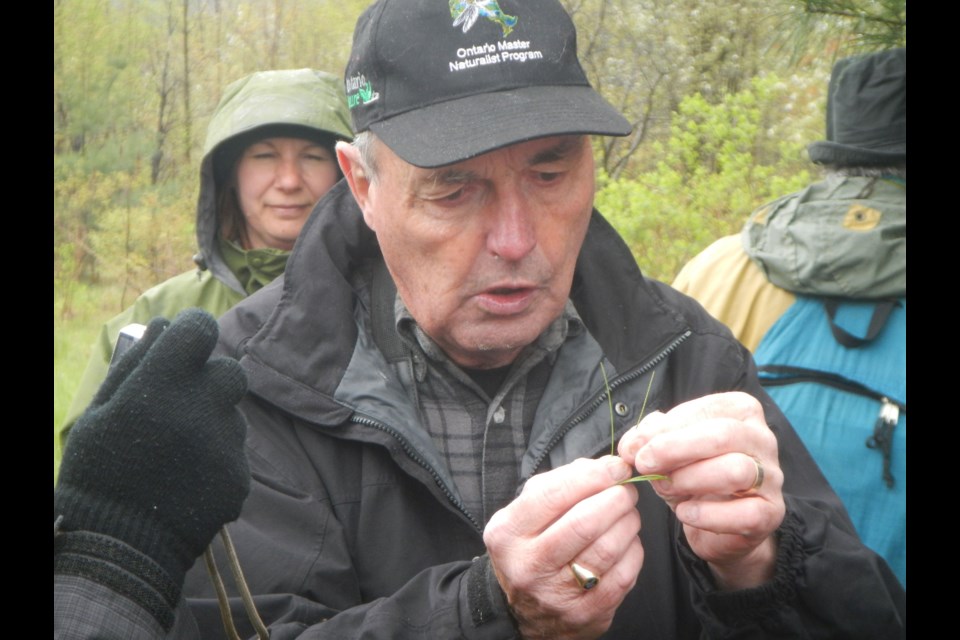A Lapland Longspur changed Bob Bowles’ life and helped put Orillia on the map.
Bowles, a well-known local naturalist, spotted the medium-sized sparrow-like bird while walking along a beach in South Carolina several years ago. Knowing it was rare to see the bird that far south, Bowles posted a notice about the sighting on a popular birding website; soon, flocks of birders showed up.
“I got talking to a guy who came to see this Lapland Longspur and he mentioned he was a graduate of the Master Naturalist program run by Clemson University,” said Bowles. “I had heard of master gardeners, but I had never heard of this program.”
After researching the program, which he soon discovered was offered in virtually every state, he called Clemson officials. They invited him to come to the school to learn about it and shared information freely during several conversations.
“I immediately knew I had to start something like this in Ontario,” said Bowles, his eyes bright with enthusiasm just talking about its genesis. “(They) said they would provide whatever support I needed, gave me a copy of their syllabus and suggested I partner with a university to get credibility.”
Upon his return to Orillia, he immediately set up a meeting with then-Lakehead University Orillia campus dean Kim Fedderson to tell him about “this fantastic idea.” Fedderson quickly threw his support behind the project and offered to help.
Over the course of several months of painstaking research and preparation, and with the help of Lakehead staff, Bowles developed the Ontario Master Naturalist program – the first of its kind in Canada. “I worked day and night and really put my heart into this,” he said.
Bowles decided to start with a six-module program and set out to attract 30 students. “I remember (Fedderson) say it might take a while to get to that point,” said Bowles, who agreed.
However, the passionate local nature lover had enlisted the help of Ontario Nature as a partner; they posted information about the new program on their website and, soon, word of the innovative idea spread. Not only did that first class, four years ago, attract 30 students, there was a waiting list with more than 50 names on it.
The program has grown exponentially since. Now, Bowles has expanded to eight modules and, last year, brought the program to the Thunder Bay campus of Lakehead, which also quickly filled to capacity; there is now a waiting list for that program as well.
Lakehead officials asked Bowles to run the program twice a year due to the soaring demand. “I said, ‘Look, I’m retired. I’m 72,’” he said. But it got him to thinking and he decided to conduct a series of day-long workshops on a range of topics. They, too, sell out quickly.
The success of the program is a testament to Bowles and partnerships, said Linda Rodenburg, a long-time professor at Lakehead in Orillia who serves as the coordinator of community programs.
“We are going into our fourth year of the Ontario Master Naturalist Program, and we have grown it from a six-module program offered in the spring in Orillia to include what is now an eight-module certificate program here, a similar week-long intensive program in Thunder Bay in July, four one-off day long experiences in the fall, and two winter sessions, one of which is a weekend experience in Algonquin Park,” said Rodenburg.
“The program really reflects our commitment to lifelong learning as accessible, academic, and interactive,” she noted, adding student naturalists participate in a lecture and then go into the field to apply their learning. “This program is the first of its kind in Canada and it is incredibly popular with all sessions filling up and a wait list for the certificate program of over 200 people.”
The key, she said, is Bowles. “Bob is passionate, knowledgeable and inspirational. He coordinates this program and he really takes his inspiration from our local environment, drawing out incredible experiences for our participants in the classroom and in the field,” Rodenburg told OrilliaMatters. “He IS a Master Naturalist and his depth and breadth of knowledge is inspirational and, at times, a bit daunting. But he's always willing to share.”
Bowles believes the program’s success is not rocket science. “It’s hands-on … you go out and you actually are immersed right in nature,” he said, noting students must also complete 30 hours of volunteer work at an environmental non-profit organization to obtain their certificate.
He also said student naturalists welcome the chance to learn from his 45 years of experience in the field. “I have such a passion for it and just love to share that experience,” he said. “I get a lot of joy out of passing that on to others.”
